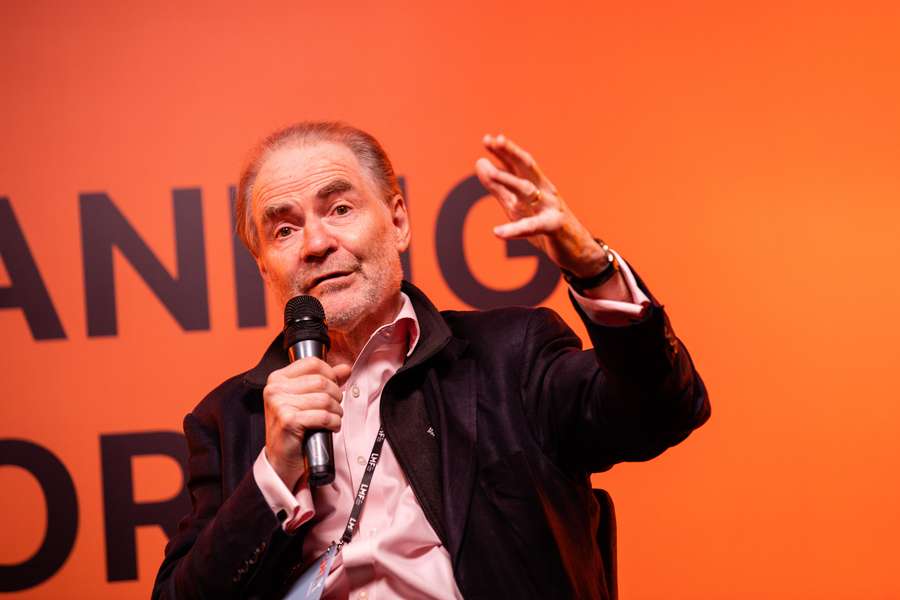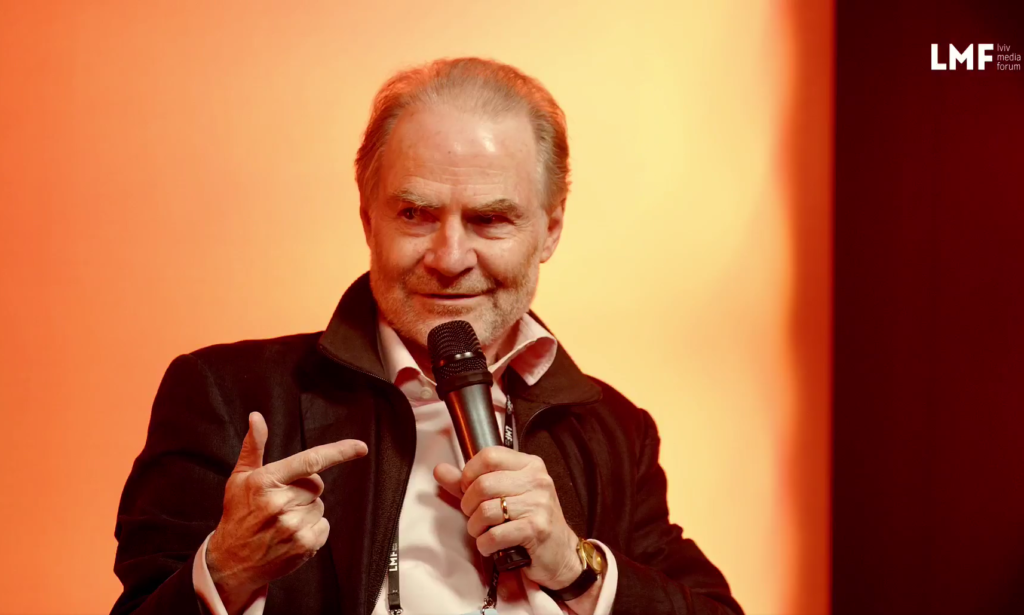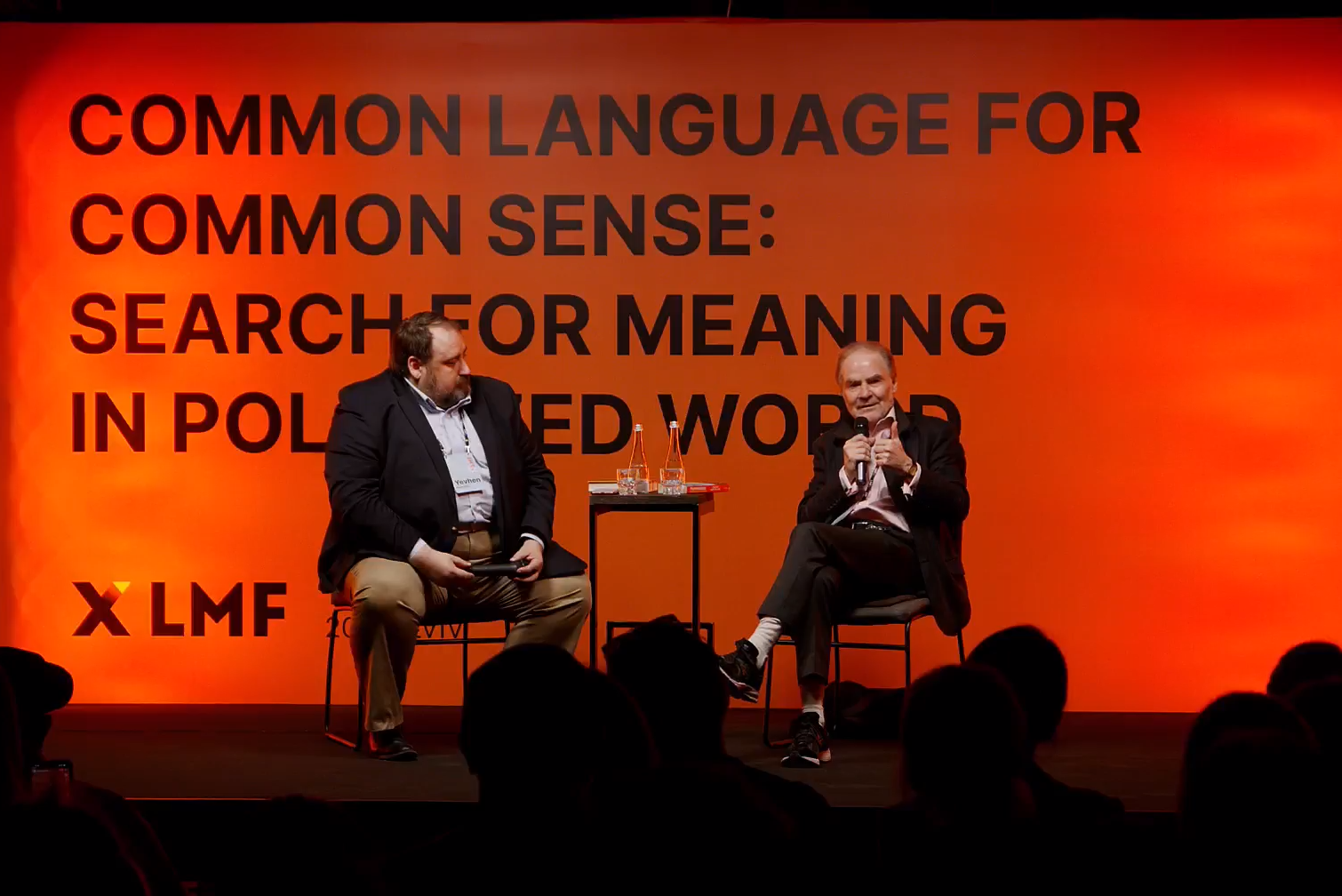“Playing not to lose” mindset hampering West’s support for Ukraine, says Timothy Ash
No football team ever wins by setting out to "not lose," and the notion that Russia is invincible is "complete nonsese," says British historian Timothy Garton Ash, insisting the West needs a paradigm shift on Ukraine


At the 10th annual Lviv Media Forum, held from 16 to 18 May, British historian and author Timothy Garton Ash engaged in a wide-ranging discussion with Yevhen Hlibovytskyi, director of the Frontline Institute and member of the Supervisory Board of Ukraine’s Public Broadcasting Company.
This year’s forum focused on the topics of “After the War or Before the War: How can civilization overcome chaos?” covering crucial issues like the ongoing war, recovery efforts, freedom of speech, media market developments, and international politics.
The panel of Timothy Ash and Yevhen Hlibovytskyi focused on Ukraine’s relations with its Western partners amidst the Russian invasion, exploring questions about securing victory, navigating negotiations with the EU and NATO, and shaping Europe’s future security architecture.
Garton Ash’s recent book “Native Lands: A History of Europe through Personal Perception,” Yevhen Hlibovytskyi presented and recommended, explores European history through personal narratives and urges Western leaders like Biden and Scholz to move past aiming for a stalemate and fully commit to enabling Ukrainian victory.
Timothy Ash and Yevhen Hlibovytskyi also analyzed Ukraine’s path toward potential EU membership and grappled with overcoming entrenched misperceptions about the war among some Western audiences.
Yevhen Hlibovytskyi, director of the Frontline Institute and member of the Supervisory Board of Ukraine’s Public Broadcasting Company, and British historian Timothy Ash speaking at the 10th Lviv Media Forum, Ukraine, 18 May 2024. Credit: Lviv Media Forum via Facebook
Yevhen Hlibovytskyi: Could you tell me what you think we don’t understand about our partners that we can’t get them to understand us?
Timothy Garten Ash: Many people in the West still don’t understand that we are in a new period of European history. What half of your partners in the West don’t understand is quite simply that we need to achieve victory. Too many of our leaders, including the Biden Administration and the Scholz government in Germany, are still in the position “we want Russia not to win and Ukraine not to lose”, but they are not clearly saying that “we need Ukraine to win.: That is what a large number of your Western partners fail to understand.
The prime minister of a small European country asked me, “What does it mean to say ‘not losing’?” And what I said to him was, “It’s very easy to understand. ‘Not losing’ means ‘losing’.”
I don’t know of any football team that has gone into a game saying our objective in this game is not to lose and has then won. It’s that fundamental paradigm shift, which I think is still missing.
I don’t know any football team that has won a game by saying “our objective is not to lose.” This fundamental paradigm shift is still missing regarding Ukraine.
Yevhen Hlibovytskyi: Both Scholz and Biden are experienced politicians. One of them actually remembers history as his own experience, while the other stands on the shoulders of his predecessors. What is it that keeps them away from accepting the idea of Russian defeat and Ukrainian victory?
Timothy Garten Ash: In Biden’s case, it is a fundamental fear of escalation, of getting into a war with Russia.
Scholz is a more complicated case. He’s shaped by a certain particular social-democratic notion of peace and the peace movement. He actually gave a speech in East Germany in 1987, saying peace can no longer be secured by military means.
Scholz would have been a perfectly good peacetime Chancellor, but he’s completely hopeless in wartime because he just doesn’t understand it. He doesn’t get that in war; you have to act faster and more decisively. You have to be bolder. You have to be braver. You have to speak differently.
Yevhen Hlibovytskyi: What is Ukraine for the West? What is Ukraine for Europeans?
Timothy Garten Ash: There has been a century-long struggle to get the rest of the world to recognize Ukraine as a large, sovereign, independent, and distinctive European nation.
I would say 2022 for Ukraine is like 1940 for Britain. Our sense of ourselves as Britons fundamentally relates back to that moment when we stood alone against Adolf Hitler. If you’re going to explain what’s happening in Ukraine, all you have to say to a British audience is, “Vladimir Putin is a new Hitler.” People immediately understand. And they say, “Okay, we’ve got to be on the right side, helping a country fighting for its freedom.”
Everybody now knows Ukraine. Everybody respects it as a European nation. No one is under any illusion that it’s in any sense part of Russia or the Russian Empire. But, of course, we’ve still got to win the war. Winning that recognition is not enough in itself.
Yevhen Hlibovytskyi: Can we find common ground with the rest of Europe so we can actually win the war, not stop it?
Timothy Garten Ash: Honestly, I think you need Patriot, RST, Taurus, and more 155 ammunition. The most important thing is the short-term, immediate thing. The West has to accept that it must be legitimate for Ukraine to strike targets in Russia.
That’s where we need to concentrate our attention.
Yevhen Hlibovytskyi: Every time I start talking about the possible collapse of Russia among analysts and policymakers, not to mention politicians, I face a denial that it can happen, which is very similar to the denial that the Soviet Union might collapse in 1989, 1990, and 1991. How do we get through?
Timothy Garten Ash: I wouldn’t count on it. But we have to understand that regimes like Putin’s are very strong but also very brittle. They don’t bend; democracies bend. I don’t think it’s probable, but it’s certainly possible.
People in the West have this very curious notion that Russia is invincible and can’t be defeated. Complete nonsense. We see from history: Russia can lose, and it’s quite possible that would catalyze longer-term, desirable change inside Russia.

Yevhen Hlibovytskyi: Considering that Putin has exterminated all moderate alternatives, does that mean whoever comes in, however vicious, in Russia will be able to dictate its will to the free world?
Timothy Garten Ash: I have no idea what’s going to happen in Russia, nor do they. I don’t think we should spend too much time speculating about domestic developments inside Russia, particularly because we can’t influence it much. However, we can defend ourselves and ensure that we are strong. If you’re making the argument for Ukrainian victory, you can describe what’s happening in Ukraine in moral, legal, and emotional terms.
There’s also the argument about the security of Europe: if Putin wins here, he won’t stop there.
However, there’s a third argument about the rest of the world. In the eyes of the rest of the world, this is a war between Russia and the West. We also have to remind people in the West that it’s not just about Ukraine or European security vis-à-vis Russia. It’s the entire credibility of the West that is at stake.
Every time I visit Lviv, I go to the military cemetery, the Field of Mars. In late 2022, for the first time, I talked to a very brave volunteer soldier, Yevhen Hulevych, a literary critic and artistic figure known to some of you. Sadly, he was killed on the last day of 2022 in the fighting near Bakhmut. I visited his grave again yesterday.
Help us make more articles like these — become a patron.
The number of graves has essentially doubled since the end of 2022. The most recent grave has a date of death of 11 May, just a week ago. The sight of mothers and widows sitting silently with bowed heads and sorrowful faces by the graves of their loved ones will never be forgotten.
This is particularly important to convey to Europe, whose motto since 1945 was “never again.” That’s how we defined it, and yet, it’s happening again. The moral, historical, legal, and political arguments are crucial, but the human tragedy is what truly resonates.

Yevhen Hlibovytskyi: Can we expect fair negotiations for EU membership? Is there a risk that Ukraine will be an unwanted child in the EU?
Timothy Garten Ash: The EU has moved at warp speed in relation to Ukraine. Tremendous goodwill still exists towards Ukraine. Countries that used to be extremely reluctant about eastward enlargement, like France, have changed their position.
The danger is this: If some of the bad old ways start coming back inside Ukraine, and there have been one or two worrying signs of this coming from the presidential administration, over-centralization, and authoritarian tendencies, all those negative stereotypes will come back with a vengeance. All those people in the EU who are reluctant to see this enlargement will seize on these as arguments.
Yevhen Hlibovytskyi: The question is, at this point, this is the only workable system, and the patches of new, modern thinking that we see remind us of guerrilla warfare, not a regular army. There is a need for a more acute understanding that even though Ukraine may be bad in some cases, it still should be the bet for the sake of Europe.
Timothy Garten Ash: The challenge you have is how you get from one to the other. I think the transition moment is difficult, particularly if it’s not like yesterday when we were at war, but now we’re at peace. It’s going to be very messy. I agree support for Ukraine, particularly military and economic support, should not be dependent on that until the moment of victory. But I think how you make that transition will be quite demanding.
Questions from the audience
Audience 1: What caused Britain to be the first to sign a long-term strategic partnership with Ukraine? And what would happen if Trump won in the UK?
Timothy Ash: The fundamental answer is Churchill in 1940. It’s instinctive for us to support a country being bullied by the new Hitler. More specifically, the British military and Conservative Party started responding after 2014, training Ukrainian soldiers. This support is cross-party – you don’t need to worry about our election, but we don’t have much money or weapons left. The risk is if Trump wins in the US on 5 November. Putin is betting on a Trump victory – Trump’s second term will be very different from his first, more unpredictable, isolated, and isolationist. We must be extremely worried about that moment, so Europe must do more now.
Ulana from ABC News: How do we change our mindset to set up new rules for this new era instead of dragging in old attitudes?
Timothy Ash: The Europe we have today is a product of four generations shaped by direct war experiences – the 14ers, 39ers, 68ers, and 89ers. The question is whether we can learn from history without going through it again ourselves. In Ukraine and Eastern Europe, a new generation, the 22ers, have learned from direct experience. But in Western Europe, it’s different because it’s not a direct personal experience for most. The challenge is conveying that sense of urgency.
Eva from People in Need: Is it unfair that Ukrainians are fighting for the whole Western world? What is your opinion on NATO countries being directly involved?
Timothy Ash: Deploying Western ground troops directly into combat roles is politically unrealistic. But more direct support is possible, like extending air defenses across Western Ukraine and conducting more intensive military training in-country under those air defenses. I hope we move in that direction before the situation becomes truly dramatic, rather than expecting Western boots on the ground.
Gulliver Craig, France 24: What is the toughest conversation you’ve had with somebody who disagreed with you about Ukraine? What are the strongest arguments against supporting Ukraine?
Timothy Ash: The most dangerous argument gaining ground with reasonable people is: “It’s not going well, we’ve given a lot, let’s redefine victory as roughly the current territorial division. Ukraine can then be like West Germany in the Cold War and reunite decades later.” But this is a complete illusion. The occupied territories are undergoing terror and systematized Russification. A divided Ukraine would be very unstable, with bitter politics, not like West Germany at all. This argument is completely fallacious.
Rebecca: Is interrupting Russian media channels the recipe to win the information war, when figures like Putin still get airtime?
Timothy Ash: I’m passionately in favor of free speech – we should fight back with good arguments, media and reporting rather than bans. But social media platforms do have a responsibility to impose some standards, as Russian disinformation thrives there. George Orwell is the model – be honest about your partiality, criticize your own side most harshly after taking a side, and continue that work as journalists, writers, and academics.
More from the Lviv Media Forum:
- National revival is Belarus’ best defense against Putin and Lukashenka
- Story of Ukraine is a Black experience, says African-American reporter
- Calls for Ukraine to stop defending itself are immoral, Nobel laureate Matviichuk says
- Belarusian “unfinished revolution” resists from the shadows, awaiting window of opportunity



